外研版必修三Module 4 Sandstorms in AsiaListening & Speaking课件(13张ppt)
文档属性
| 名称 | 外研版必修三Module 4 Sandstorms in AsiaListening & Speaking课件(13张ppt) |
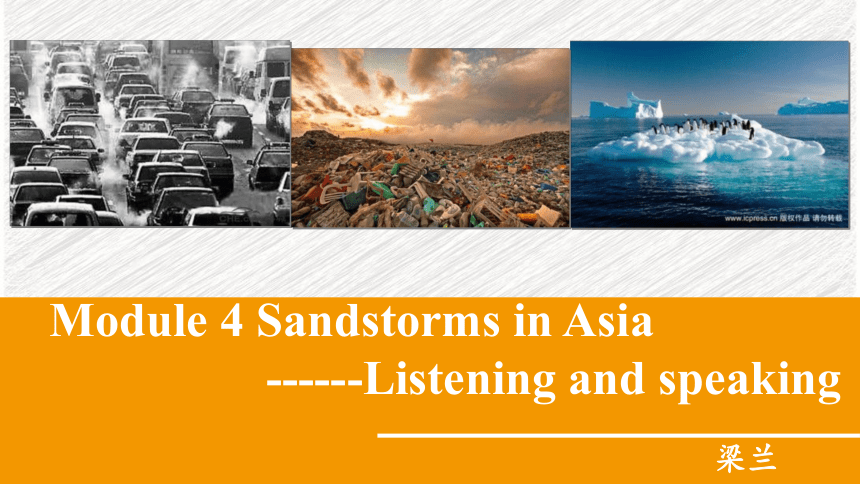
|
|
| 格式 | zip | ||
| 文件大小 | 2.4MB | ||
| 资源类型 | 教案 | ||
| 版本资源 | 外研版 | ||
| 科目 | 英语 | ||
| 更新时间 | 2022-02-26 00:00:00 | ||
图片预览

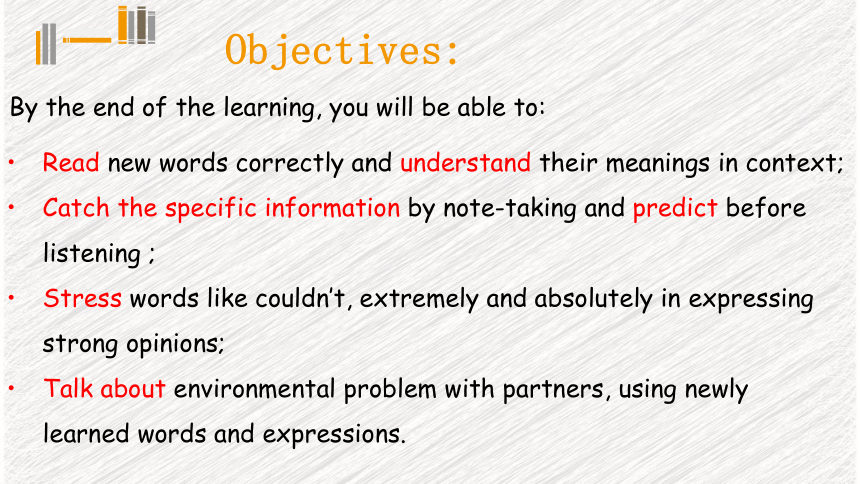
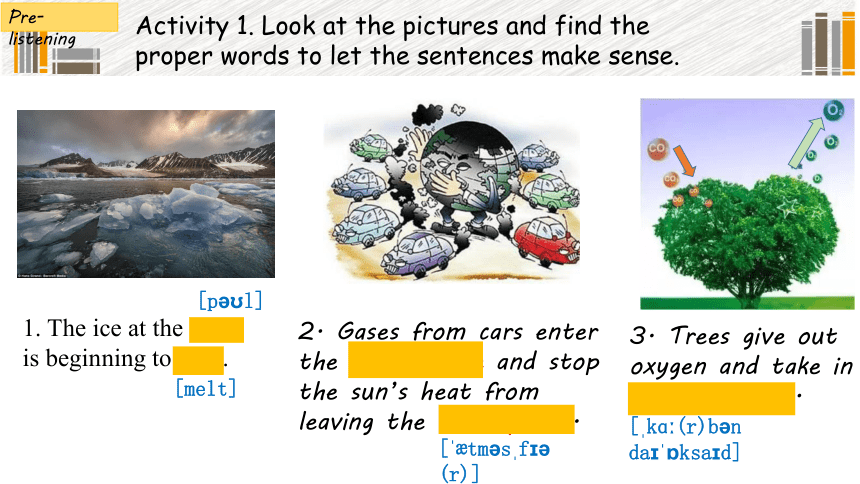
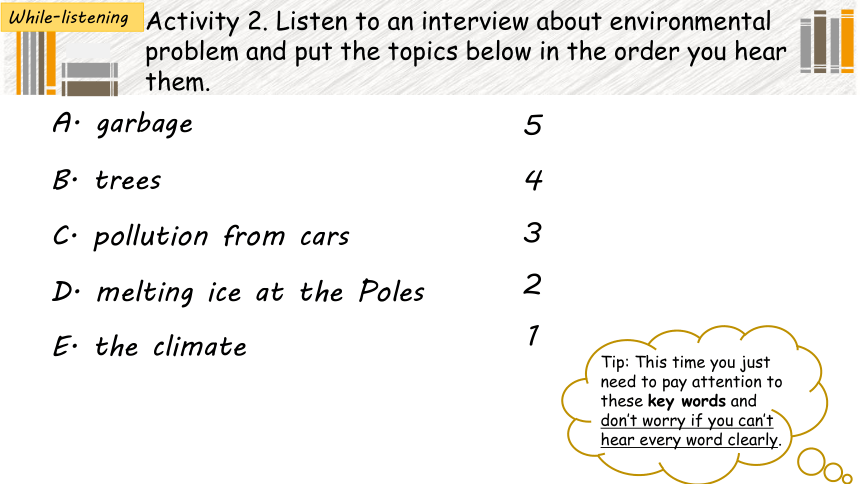
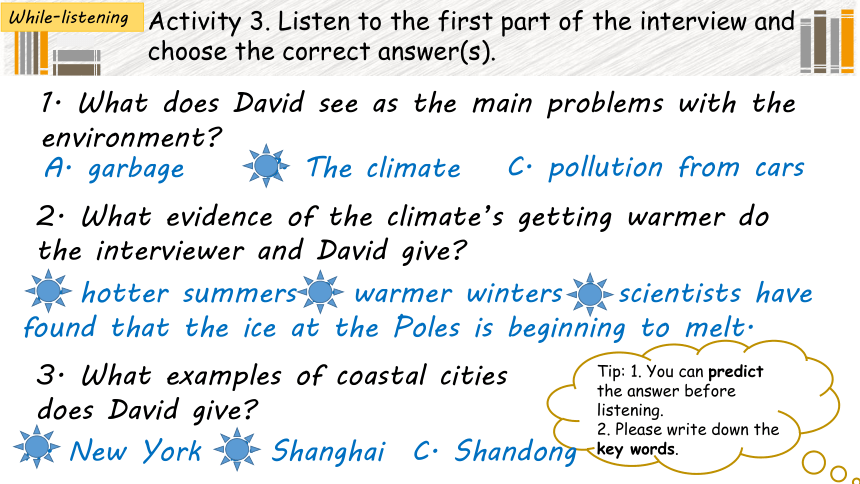
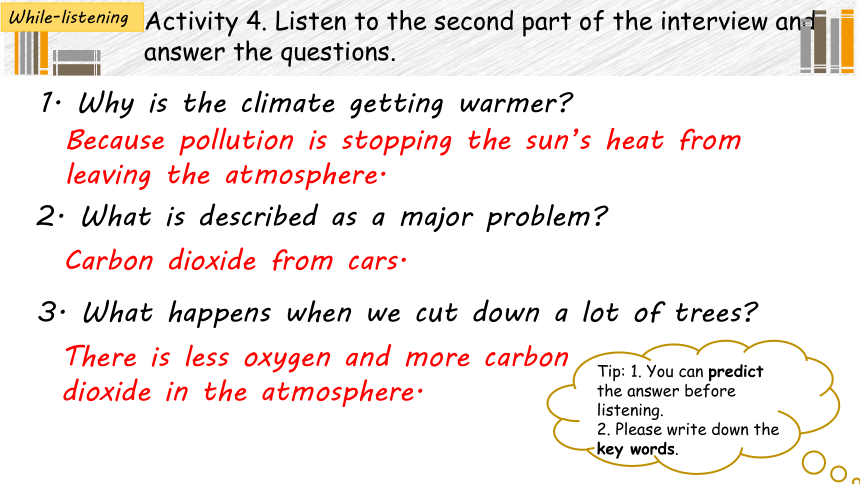
文档简介
(共13张PPT)
Module 4 Sandstorms in Asia
------Listening and speaking
梁兰
Objectives:
By the end of the learning, you will be able to:
Read new words correctly and understand their meanings in context;
Catch the specific information by note-taking and predict before listening ;
Stress words like couldn’t, extremely and absolutely in expressing strong opinions;
Talk about environmental problem with partners, using newly learned words and expressions.
Activity 1. Look at the pictures and find the proper words to let the sentences make sense.
23
3. Trees give out oxygen and take in carbon dioxide.
Pre-listening
[ kɑ (r)b n da ksa d]
1. The ice at the Poles is beginning to melt.
2. Gases from cars enter the atmosphere and stop the sun’s heat from leaving the atmosphere.
[melt]
[p l]
[ tm s f (r)]
23
Activity 2. Listen to an interview about environmental problem and put the topics below in the order you hear them.
A. garbage
B. trees
C. pollution from cars
D. melting ice at the Poles
While-listening
Tip: This time you just need to pay attention to these key words and don’t worry if you can’t hear every word clearly.
E. the climate
5
4
3
2
1
23
Activity 3. Listen to the first part of the interview and choose the correct answer(s).
1. What does David see as the main problems with the environment
3. What examples of coastal cities does David give
2. What evidence of the climate’s getting warmer do the interviewer and David give
B. The climate
While-listening
Tip: 1. You can predict the answer before listening.
2. Please write down the key words.
A. New York B. Shanghai C. Shandong
A. hotter summers B. warmer winters C. scientists have found that the ice at the Poles is beginning to melt.
C. pollution from cars
A. garbage
23
Activity 4. Listen to the second part of the interview and answer the questions.
1. Why is the climate getting warmer
3. What happens when we cut down a lot of trees
2. What is described as a major problem
Because pollution is stopping the sun’s heat from leaving the atmosphere.
While-listening
Tip: 1. You can predict the answer before listening.
2. Please write down the key words.
There is less oxygen and more carbon dioxide in the atmosphere.
Carbon dioxide from cars.
23
Activity 5. Listen to the last part of the interview and answer the questions.
1. What we should do about garbage
3. How does David feel about the situation
2. How does the interviewer feel about the situation
We should recycle garbage.
While-listening
Tip: 1. You can predict the answer before listening.
2. Please write down the key words.
He is optimistic about the situation.
She feels very concerned.
23
Activity 6. Listen and underline the words the speaker stress.
A: We need to plant more trees.
B: I couldn’t agree with you more. / I think you are absolutely right.
2. It couldn’t be worse. / It’s absolutely hopeless.
The traffic in this city just doesn’t move.
3. The world’s climate seems to be getting warmer. It’s extremely serious.
4. A: What are you going to do B: I have no idea.
Post-listening
Why do the speaker stress those words
A. To express strong opinions
B. To make our voice clearly
23
Activity 7. Match the environmental problems with causes.
Post-listening
The ice at the Poles is beginning to melt.
Carbon dioxide and atmospheric pollution.
Garbage
Coal
Cutting down trees
Fridges
Cars
23
Activity 8. Talk-time: talk about problems with environment and what we should do to improve it.
Tip: Please pay attention to the pronunciation intonation and try to use newly learned words and phrases as many as possible.
Post-listening
Expressing strong opinions:
1. I couldn’t agree with you more.
2. I think you are absolutely right.
3. It’s extremely serious.
4. I have no idea.
5. It couldn’t be worse.
6. It’s absolutely hopeless.
7. I’m afraid that I cannot agree with you.
8. I don’t think so.
Things that are bad for environment:
coal plastic refrigerators cars cutting down trees…
Useful words you can use:
damage give out carbon dioxide chemicals pollute…
Useful expressions you can use:
We should…
We need to…
We must…
It’s…for…to do sth.
…
Self-check
Objectives
Great
Just so-so
Keep working
1. Read new words correctly and understand their meanings in context;
2. Catch the specific information by note-taking and predict before listening ;
3. Stress words like couldn’t, extremely and absolutely in expressing strong opinions;
4. Talk about environmental problem with partners, using newly learned words and expressions.
Improvements I can make
E.g. To improve my note-taking skill while listening, I plan to practice taking notes by listening news after school.
23
Homework
1. Preview p39 Cultural Corner: look up new words and some information about the following environmental organizations: 世界环保组织(IUCN)、世界自然基金会(WWF)、全球环境基金(GEF)、国际绿色和平组织(Greenpeace)、地球之友(Friends of The Earth(HK))
2. Revise what we have learned today (new words, expressions…).
4. Organize your notes on the notebook.
3. Read the listening material and record it. (*pronunciation and intonation).
Thank you for listening and watching~
Module 4 Sandstorms in Asia
------Listening and speaking
梁兰
Objectives:
By the end of the learning, you will be able to:
Read new words correctly and understand their meanings in context;
Catch the specific information by note-taking and predict before listening ;
Stress words like couldn’t, extremely and absolutely in expressing strong opinions;
Talk about environmental problem with partners, using newly learned words and expressions.
Activity 1. Look at the pictures and find the proper words to let the sentences make sense.
23
3. Trees give out oxygen and take in carbon dioxide.
Pre-listening
[ kɑ (r)b n da ksa d]
1. The ice at the Poles is beginning to melt.
2. Gases from cars enter the atmosphere and stop the sun’s heat from leaving the atmosphere.
[melt]
[p l]
[ tm s f (r)]
23
Activity 2. Listen to an interview about environmental problem and put the topics below in the order you hear them.
A. garbage
B. trees
C. pollution from cars
D. melting ice at the Poles
While-listening
Tip: This time you just need to pay attention to these key words and don’t worry if you can’t hear every word clearly.
E. the climate
5
4
3
2
1
23
Activity 3. Listen to the first part of the interview and choose the correct answer(s).
1. What does David see as the main problems with the environment
3. What examples of coastal cities does David give
2. What evidence of the climate’s getting warmer do the interviewer and David give
B. The climate
While-listening
Tip: 1. You can predict the answer before listening.
2. Please write down the key words.
A. New York B. Shanghai C. Shandong
A. hotter summers B. warmer winters C. scientists have found that the ice at the Poles is beginning to melt.
C. pollution from cars
A. garbage
23
Activity 4. Listen to the second part of the interview and answer the questions.
1. Why is the climate getting warmer
3. What happens when we cut down a lot of trees
2. What is described as a major problem
Because pollution is stopping the sun’s heat from leaving the atmosphere.
While-listening
Tip: 1. You can predict the answer before listening.
2. Please write down the key words.
There is less oxygen and more carbon dioxide in the atmosphere.
Carbon dioxide from cars.
23
Activity 5. Listen to the last part of the interview and answer the questions.
1. What we should do about garbage
3. How does David feel about the situation
2. How does the interviewer feel about the situation
We should recycle garbage.
While-listening
Tip: 1. You can predict the answer before listening.
2. Please write down the key words.
He is optimistic about the situation.
She feels very concerned.
23
Activity 6. Listen and underline the words the speaker stress.
A: We need to plant more trees.
B: I couldn’t agree with you more. / I think you are absolutely right.
2. It couldn’t be worse. / It’s absolutely hopeless.
The traffic in this city just doesn’t move.
3. The world’s climate seems to be getting warmer. It’s extremely serious.
4. A: What are you going to do B: I have no idea.
Post-listening
Why do the speaker stress those words
A. To express strong opinions
B. To make our voice clearly
23
Activity 7. Match the environmental problems with causes.
Post-listening
The ice at the Poles is beginning to melt.
Carbon dioxide and atmospheric pollution.
Garbage
Coal
Cutting down trees
Fridges
Cars
23
Activity 8. Talk-time: talk about problems with environment and what we should do to improve it.
Tip: Please pay attention to the pronunciation intonation and try to use newly learned words and phrases as many as possible.
Post-listening
Expressing strong opinions:
1. I couldn’t agree with you more.
2. I think you are absolutely right.
3. It’s extremely serious.
4. I have no idea.
5. It couldn’t be worse.
6. It’s absolutely hopeless.
7. I’m afraid that I cannot agree with you.
8. I don’t think so.
Things that are bad for environment:
coal plastic refrigerators cars cutting down trees…
Useful words you can use:
damage give out carbon dioxide chemicals pollute…
Useful expressions you can use:
We should…
We need to…
We must…
It’s…for…to do sth.
…
Self-check
Objectives
Great
Just so-so
Keep working
1. Read new words correctly and understand their meanings in context;
2. Catch the specific information by note-taking and predict before listening ;
3. Stress words like couldn’t, extremely and absolutely in expressing strong opinions;
4. Talk about environmental problem with partners, using newly learned words and expressions.
Improvements I can make
E.g. To improve my note-taking skill while listening, I plan to practice taking notes by listening news after school.
23
Homework
1. Preview p39 Cultural Corner: look up new words and some information about the following environmental organizations: 世界环保组织(IUCN)、世界自然基金会(WWF)、全球环境基金(GEF)、国际绿色和平组织(Greenpeace)、地球之友(Friends of The Earth(HK))
2. Revise what we have learned today (new words, expressions…).
4. Organize your notes on the notebook.
3. Read the listening material and record it. (*pronunciation and intonation).
Thank you for listening and watching~
